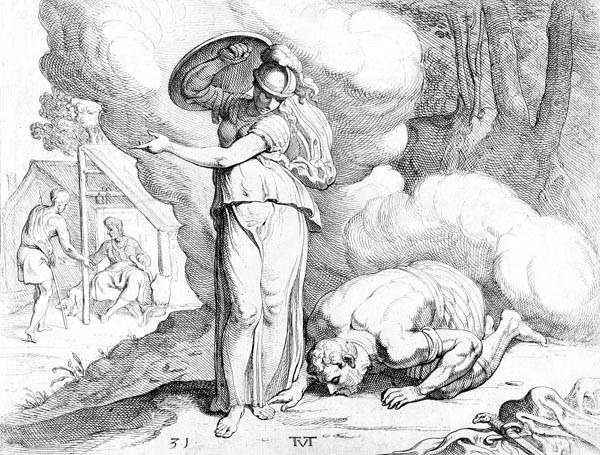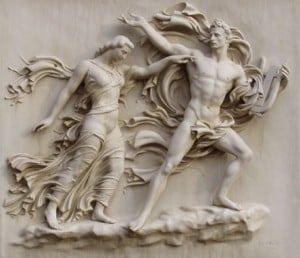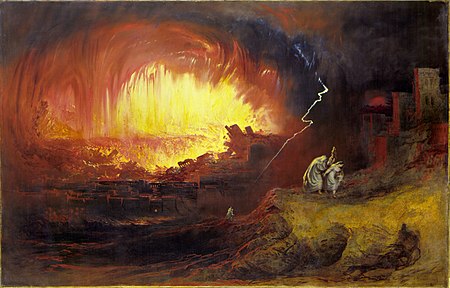Stop me if you’ve heard this one before….
There was once a very pious man who lived in a city that had been taken over by very wicked people.
Messengers from the deity came to visit that pious man and were very impressed with his hospitality toward them even though he did not know they were divine persons on a divine mission. These messengers also witnessed the wickedness of those around him.
So the divine agents stepped in to help that pious man in his troubles with the wicked ones
First, they (the messengers) warned the pious man that the deity was going to destroy all those wicked folk.
Meanwhile the wicked people not only ignored the warning that they also heard but continued in their wickedness, including forbidden sexual behaviour.
The pious man was so pious that he even tried to warn the wicked doers that they were about to be destroyed but they ignored him.
Finally, all the wicked perish.
Further destruction awaits those who ignore a specific divine interdiction.
I dare say most readers would have recognized the story of Lot, his daughters and wife, and the people of Sodom.
Ancient persons more familiar with Homeric epics would have recognized the story of Odysseus’s homecoming.
I should emphasize that I am not arguing for influence between the Odyssey and the biblical account, nor a common source. Rather, I suggest that as both accounts share a considerable number of motifs, a similar “grammar” underlies each myth.
(Louden, 96)
 In Genesis 19 we read how Lot welcomed two strangers not realizing they were in fact angels. As we know, like Abraham before him he passed the hospitality test. Odysseus was similarly tested by a divinity in disguise:
In Genesis 19 we read how Lot welcomed two strangers not realizing they were in fact angels. As we know, like Abraham before him he passed the hospitality test. Odysseus was similarly tested by a divinity in disguise:
Athene now appeared upon the scene. She had disguised herself as a young shepherd, with all the delicate beauty that marks the sons of kings. A handsome cloak was folded back across her shoulders, her feet shone white between the sandal-straps, and she carried a javelin in her hand. She was a welcome sight to Odysseus, who came forward at once and accosted her eagerly. ‘Good-day to you, sir,’ he said. ‘Since you are the first person I have met in this place, I hope to find no enemy in you, but the saviour of my treasures here and of my very life; and so I pray to you as I should to a god and kneel at your feet. (Odyssey, Book 13 Rieu translation)
The goddess Athene repeatedly helps and advises Odysseus in order for him to be able to reclaim his household from the evil suitors who have taken over everything of his. The suitors were all earnestly hoping to have Odysseus wife Penelope, but in the meantime they slept with Odysseus’s maidservants, wasting his resources, and acting violently towards strangers and guests, so that their “insolence and violent acts cry out to heaven.”
The evil suitors merely laughed at the warnings of their imminent doom.
And now the voice of the noble Theoclymenus was heard. ‘Unhappy men,’ he cried, ‘what blight is this that has descended on you? Your heads, your faces, and your knees are veiled in night. There is a sound of mourning in the air; I see cheeks wet with tears. And look, the panels and the walls are splashed with blood. The porch is filled with ghosts. So is the court – ghosts hurrying down to darkness and to Hell. The sun is blotted out’ from heaven and a malignant mist has crept upon the world.’
They laughed at him. They laughed delightedly, with one accord; and Polybus’ son, Eurymachus, got up and shouted: ‘Our new friend’s wits have suffered on his journey from abroad. Quick, you fellows, show him out and direct him to the marketplace, since he finds it so dark in here.’
‘Eurymachus,’ the seer replied; ‘I want no help from you to find my way. I have eyes and ears and two feet of my own, as well as a pretty sound head on my shoulders – quite enough to get me out of doors, where I am going now. For I see advancing on you all a catastrophe which you cannot hope to survive or shun, no, not a single one of you who spend your time insulting folk and running riot in King Odysseus’ house.’ And with that he strode from the palace and sought out Peiraeus, who received him kindly.
But the Suitors, after exchanging a few encouraging glances, began one and all to bait Telemachus by holding up his guests to ridicule. (Book 20)
The destruction follows. But even after the wicked are all dead there remain a few others who disobey divine obligations and must also die: Lot’s wife and Odysseus’s female servants who had sex with the suitors. The divine command not to look back and then losing one’s life when the order is disobeyed is well-known in Greek myths; Lot’s wife, however, is punished the same way a Phaeacian crew were turned to a rocky mountain for disobeying an implicit wish of the god Poseidon.
While on the subject of the story of Lot, another scholar, Philippe Wajdenbaum, finds affinities with another classical myth, one told by the poet Ovid:
There is a swamp not far from there, once habitable land but now the haunt of diving-birds and marsh-loving coots. Jupiter went there, disguised as a mortal, and Mercury, the descendant of Atlas, setting aside his wings, went with his father, carrying the caduceus.
A thousand houses they approached, looking for a place to rest: a thousand houses were locked and bolted.
But one received them: it was humble it is true, roofed with reeds and stems from the marsh, but godly Baucis and the equally aged Philemon, had been wedded in that cottage in their younger years, and there had grown old together. They made light of poverty by acknowledging it, and bearing it without discontent of mind. It was no matter if you asked for owner or servant there: those two were the whole household: they gave orders and carried them out equally.
So when the gods from heaven met the humble household gods, and stooping down, passed the low doorway, the old man pulled out a bench, and requested them to rest their limbs, while over the bench Baucis threw a rough blanket…
They had a goose, the guard for their tiny cottage: as hosts they prepared to sacrifice it for their divine guests. But, quick-winged, it wore the old people out and, for a long time, escaped them, at last appearing to take refuge with the gods themselves. Then the heaven-born ones told them not to kill it. ‘We are gods’, they said, ‘and this neighbourhood will receive just punishment for its impiety, but to you we grant exemption from that evil. Just leave your house, and accompany our steps, as we climb that steep mountainside together. (Ovid, Metam. VIII, 620-725)
After escaping with their divine rescuers Baucis and Philemon look down from their mountain height to see their whole countryside flooded with only one cottage having escaped, their own. (It was nonetheless important for them to leave anyway because their dwelling was soon changed into a temple.)
‘When they were a bowshot distant from the top, they looked round and saw all the rest of their country drowned in marshy waters, only their own home left standing. As they gazed in astonishment, and wept for the fate of their people, their old cottage, which had been small, even for two, was changed into a temple: marble columns took the place of its wooden supports, the thatch grew yellow, till the roof seemed to be made of gold, the doors appeared magnificently adorned with carvings, and marble paved the earthen floor. (Ovid, Book VIII — Mary Innes translation)
 And again, on a detail we mentioned above concerning Lot’s wife, we have this time the story of Orpheus and Eurydice, though the Biblical account is more morally satisfying in that the one who looks back is the one who dies:
And again, on a detail we mentioned above concerning Lot’s wife, we have this time the story of Orpheus and Eurydice, though the Biblical account is more morally satisfying in that the one who looks back is the one who dies:
They took the upward path, through the still silence, steep and dark, shadowy with dense fog, drawing near to the threshold of the upper world. Afraid she was no longer there, and eager to see her, the lover turned his eyes. In an instant she dropped back, and he, unhappy man, stretching out his arms to hold her and be held, clutched at nothing but the receding air. Dying a second time, now, there was no complaint to her husband (what, then, could she complain of, except that she had been loved?). She spoke a last ‘farewell’ that, now, scarcely reached his ears, and turned again towards that same place. (Ovid, Metamorphosis X, 45-50; see also Virgil, Georgies IV, 475-500)
As for the aftermath of the destruction of Sodom when Lot’s daughters get their father drunk in order to have children by him, Ovid again suggests a source:
So, while the king’s bed was empty of its lawful occupant, the nurse, with misguided eagerness, waiting till Cinyras was drowsy with wine, told him of the girl who was in love with him, altering nothing but her name, and praised her beauty. . . .
As she hesitated, the old nurse took her by the hand, and led her close up to the king’s high couch. Handing the girl over to him, “Take her, Cinyras,” she said, “she is yours.” And she left the doomed pair together. The father welcomed his own flesh and blood into that bed of horror, soothed her girlish fears, and encouraged her when she was afraid. It may well be that he used the name appropriate to her age, and called her “daughter”, while she called him “father”, so that even the names were not wanting to complete their wickedness.
‘When she had been filled with her father’s seed, Myrrha left his room, bearing in her disgusting womb a sinful burden, the child she had criminally conceived. The next night they repeated their wickedness, nor was that the end of it. . . . (Ovid, Book X — Mary Innes translation)
Myrrha’s biblical counterparts are stripped of Myrrha’s love for her father and get him drunk in order to have children by him for the “more moral” reason that they believed they were the last people left on earth.
Wajdenbaum comments:
Lot’s story mirrors that of Philemon and Baucis until the moment when they leave the city, when it diverges. Philemon and Baucis both end up safe, but Lot’s wife is taken out of the picture because she disobeyed, looking back as in Eurydice’s story; Lot’s daughters are thus given a reason to sleep with their drunken father, as Myrrha did. So we find two consecutive chapters from Genesis that contain four stories similar to those found in Ovid. It is likely that both Ovid and the biblical writer shared a common source, probably from the Hellenistic era. (p. 119)
.
Louden, Bruce. 1999. The Odyssey : Structure, Narration, and Meaning. Baltimore : Johns Hopkins University Press.
Wajdenbaum, Philippe. 2011. Argonauts of the Desert: Structural Analysis of the Hebrew Bible. London ; Oakville: Equinox.
Homer. 1946. The Odyssey. Translated by E.V Rieu. Ringwood, Vic.: Penguin Books.
Ovid. 1993. The Metamorphoses of Ovid. Translated by Mary M Innes. New York: Penguin Books.
If you enjoyed this post, please consider donating to Vridar. Thanks!


2 thoughts on “Two Mini-Apocalypses, Greek and Biblical & A Common Mythic Grammar”